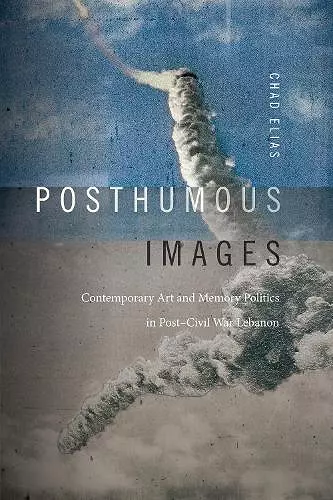Posthumous Images
Contemporary Art and Memory Politics in Post–Civil War Lebanon
Format:Paperback
Publisher:Duke University Press
Published:15th Jun '18
Currently unavailable, and unfortunately no date known when it will be back
This paperback is available in another edition too:
- Hardback£85.00(9780822347101)

For almost two decades of its history (1975-90), Lebanon was besieged by sectarian fighting, foreign invasions, and complicated proxy wars. In Posthumous Images, Chad Elias analyzes a generation of contemporary artists who have sought, in different ways, to interrogate the contested memory of those years of civil strife and political upheaval. In their films, photography, architectural projects, and multimedia performances, these artists appropriate existing images to challenge divisive and violent political discourses. They also create new images that make visible individuals and communities that have been effectively silenced, rendered invisible, or denied political representation. As Elias demonstrates, these practices serve to productively unsettle the distinctions between past and present, the dead and the living, official history and popular memory. In Lebanon, the field of contemporary art is shown to be critical to remembering the past and reimagining the future in a nation haunted by a violent and unresolved war.
"Sophisticated and carefully researched . . . . The significance of [Elias's] book for current Anglophone art history is its in-depth and rewarding analysis of a context outside the usual terms of reference." -- Tom Snow * Art Monthly *
"Posthumous Images is a welcome contribution to the study of contemporary art from the Middle East, significant in its substantive engagements with a generation of artists in Lebanon that has been championed around the world for its theoretically sophisticated responses to a devastating conflict and its tense, inconclusive afterlives. Elias offers important provocations for further study of cultural production in Lebanon, through his identification of a tension between a ‘politics of representation’ and a ‘politics of truth’, his attention to ‘communities of witnessing’ that contest a state-imposed post-war condition of forgetting, and his analysis of the role of media technologies in circulating images of contested histories." -- Kareem Estefan * Third Text *
"Elias’s erudite and thoughtful writing, self-reflexively aware of the failures of translation, offers a refreshing alternative to this starved corpus. . . . Posthumous Images generates a valuable dialogue between theory and art, whereby they complicate and complement one another." -- Foad Torshizi * Arab Studies Quarterly *
"Posthumous Images is a rigorous work of scholarship that offers a timely intervention into existing discourses on lens-based media and memory. The book offers a clear and important route to thinking beyond the widely accepted inadequacies of the visual without recourse to conventional models of documentary truth." -- Kimberly Schreiber * Object *
"Posthumous Images is, in sum, a brilliant book, sparkling with ambition and insight but also a couple of squibs in judgement that may be attributed more to the confidence of an exuberant intellect at work than to any lack of sensitivity." -- Ken Seigneurie * Journal of Arabic Literature *
"This is a stimulating study, impressive in its writing. Because Elias builds his chapters upon a culled selection of work, there is space for him to construct his claims through elegant constellations of references to theorists rather than direct citations of historical studies. The result is a book that gives air to both its readings and possible gaps in those readings’ explanatory power." -- Anneka Lenssen * Art Journal *
“Using a variety of contemporary Lebanese works of art..., Elias analyzes and illustrates how contemporary art plays a critical role in attempting to evoke the past and recreate the future under conditions of amnesia, violence, and unresolved war.... [Posthumous Images] is clearly written; its arguments are convincingly constructed and structured.” -- Elsa El Hachem-Kirby * Mashriq & Mahjar *
ISBN: 9780822347668
Dimensions: unknown
Weight: 476g
264 pages